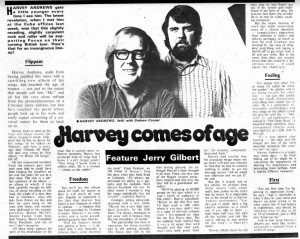 It seems that Phil Ochs is finally being given the place he has long deserved in the history of 20th century song writing.
It seems that Phil Ochs is finally being given the place he has long deserved in the history of 20th century song writing.
This film will make him accessible to a generation that in many ways is still facing the same problems and wars that Phil wrote about.
He was an inspiration to me as the following extract from my second book, currently in progress, relates.
Bob Dylan may well have got the ball rolling for me and many others but when I first listened to the songs of Tom Paxton I knew this was the road I was going to follow. His songs, and those of Phil Ochs, chronicled the times we were living through. In many ways these songwriters of the 60’s were cultural historians, dealing with issues like the Vietnam War, civil rights and societal problems. Both Paxton and Ochs could tell stories with searingly truthful lyrics or with satire and humour. They also wrote understated love songs. To me they were just an extension into my own times of the traditional songs I was hearing in the folk clubs that told the stories of the extraordinary lives of ordinary people; their struggles, their wars, their loves, their dreams.
I began learning Tom’s songs immediately. He had a facility for writing simple, and most importantly, playable melodies. “Last thing on my mind”, “Ramblin’ Boy”, “Natural Girl For Me”, and “What Did You Learn in School Today” became fixtures in my performances, and audiences loved to sing the choruses.
Ochs’s songs were more problematic. They too dealt with political and social issues but in a more direct and journalistic way. They were less accessible for performance and very specifically about America and its problems, although I was hooked on them all. However, his more gentle songs “When I’m Gone”, and “Changes” entered my repertoire.
Because I now had transport, still a sought after thing on the folk scene at the time, an opportunity was offered to me that I couldn’t possibly refuse. Ioan Allen told me that Phil Ochs was appearing in concert at, I think, Nottingham; that he had a couple of days free afterwards and that hotel and finance problems meant he had nowhere to stay. Would I like to drive over, see the concert, pick him up and bring him back to my flat to stay for a couple of nights?
Would I!
Seeing Phil on stage was a revelation. He had some new songs that instantly appealed to me and meeting him backstage after the gig was an unforgettable moment. That night, into the early hours, Phil and I talked. We shared a love of Buddy Holly and played a few old singles. We discussed the folk scene and eventually got on to Bob Dylan. Phil mentioned that some people would happily kill Dylan and we talked about the repercussions of his assassination. I said it would be like the crucifixion of Christ to many and would give “the movement” a martyr, something all causes needed as a rallying point. Eventually he slept in my bed and I slept on the floor of my living room.
In the morning I got my tape recorder running and persuaded Phil to record his two new songs for me, “Flower Lady” and “Cannons of Christianity”.
“Two n’s or one?” he asked, before apologising for his voice; “It’s hard singing in the morning.”
After performing the two songs he went through them again to give me the chords. Within a week the songs were added to my repertoire.
In the afternoon I took him to my mother’s where he was fed a huge plateful of meat and two veg, followed by a cannonball of stodge covered in custard. He was very appreciative. Mother had no idea who he was, but admired his old fashioned manners and his courtesy towards her. Unfortunately he lost a contact lens in the front room, even though he had a towel spread over his lap as he cleaned it. He sat unmoving as mother and I carefully examined every inch of him, the settee he was sitting on, and the carpet on the floor, all without success. Eventually he got up and mother vacuumed the room and then dissected the contents of the bag. We never found the lens and it could be lying somewhere in 85 Kenilworth Road to this day. Phil, being Phil, had no replacement, and so had to wire to America for a pair to be sent out to him.
It was in England, according to his biographer Michael Schumacher, that Phil began to write his epic song “Crucifixion”. As he stayed with me on the 24th of November and, if the book is correct, began the song on the night of the 27th, I am convinced our conversation on the night of the 24th had a lot to do with his inspiration.
Before he left he signed my visitor book: “Phil Ochs… Hanoi”



